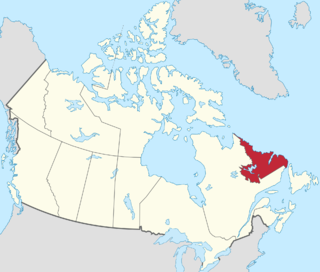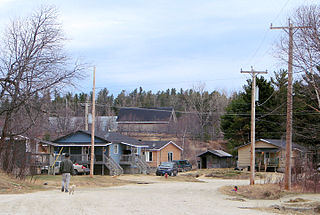Related Research Articles

Labrador is a geographic and cultural region within the Canadian province of Newfoundland and Labrador. It is the primarily continental portion of the province and constitutes 71% of the province's area but is home to only 6% of its population. It is separated from the island of Newfoundland by the Strait of Belle Isle. It is the largest and northernmost geographical region in the four Atlantic provinces.

The Algonquin people are an Indigenous people who now live in Eastern Canada. They speak the Algonquin language, which is part of the Algonquian language family. Culturally and linguistically, they are closely related to the Odawa, Potawatomi, Ojibwe, Mississaugas, and Nipissing, with whom they form the larger Anicinàpe (Anishinaabeg). Algonquins are known by many names, including Omàmiwinini and Abitibiwinni or the more generalised name of Anicinàpe.
Indigenous music of Canada encompasses a wide variety of musical genres created by Aboriginal Canadians. Before European settlers came to what is now Canada, the region was occupied by many First Nations, including the West Coast Salish and Haida, the centrally located Iroquois, Blackfoot and Huron, the Dene to the North, and the Innu and Mi'kmaq in the East and the Cree in the North. Each of the indigenous communities had their own unique musical traditions. Chanting – singing is widely popular and most use a variety of musical instruments.

Val-d'Or is a city in Quebec, Canada with a population of 32,752 inhabitants according to the 2021 Canadian census. The city is located in the Abitibi-Témiscamingue region near La Vérendrye Wildlife Reserve.

Abitibi-Témiscamingue is an administrative region located in western Québec, Canada, along the border with Ontario. It became part of the province in 1898. It has a land area of 57,736.50 square kilometres (22,292.19 sq mi) and its population was 147,082 people as of the 2021 census. The region is divided into five regional county municipalities and 79 municipalities. Its economy continues to be dominated by resource extraction industries. These include logging and mining all along the rich geologic Cadillac Fault between Val-d'Or and Rouyn-Noranda, as well as agriculture.
Indigenous peoples in Quebec total eleven distinct ethnic groups. The one Inuit community and ten First Nations communities number 141,915 people and account for approximately two per cent of the population of Quebec, Canada.

Kashtin were a Canadian folk rock duo in the 1980s and 1990s, one of the most commercially successful and famous musical groups in First Nations history.
Mabon Lewis "Teenie" Hodges was an American musician known for his work as a rhythm and lead guitarist and songwriter on many of Al Green's soul hits, and those of other artists such as Ann Peebles and Syl Johnson, on Hi Records in the 1970s. His credits as a songwriter include "Take Me to the River", "Love and Happiness", "L-O-V-E (Love)", and "Here I Am ".

The Preservation Hall Jazz Band is a New Orleans jazz band founded in New Orleans by tuba player Allan Jaffe in the early 1960s. The band derives its name from Preservation Hall in the French Quarter. In 2005, the Hall's doors were closed for a period of time due to Hurricane Katrina, but the band continued to tour.
Billy Diamond was the Chief of the Waskaganish, Quebec Cree from 1970 to 1976, the Grand Chief of the Grand Council of the Crees from 1974 to 1984, and a successful businessman who founded Air Creebec.

Inuit are a group of culturally and historically similar Indigenous peoples traditionally inhabiting the Arctic and subarctic regions of North America, including Greenland, Labrador, Quebec, Nunavut, the Northwest Territories, Yukon (traditionally), Alaska, and Chukotsky District of Chukotka Autonomous Okrug, Russia. Inuit languages are part of the Eskimo–Aleut languages, also known as Inuit-Yupik-Unangan, and also as Eskaleut. Inuit Sign Language is a critically endangered language isolate used in Nunavut.
Music of Canadian Cultures is a wide and diverse accumulation of music from many different individual communities all across Canada. With Canada being vast in size, the country throughout its history has had regional music scenes. The music of Canada has reflected the multi-cultural influences that have shaped the country. First Nations people, the French, the British, the United States and many others nationalities have all made unique contributions to the musical heritage of Canada
The following is an alphabetical list of topics related to Indigenous peoples in Canada, comprising the First Nations, Inuit and Métis peoples.
Indigenous or Aboriginal self-government refers to proposals to give governments representing the Indigenous peoples in Canada greater powers of government. These proposals range from giving Aboriginal governments powers similar to that of local governments in Canada to demands that Indigenous governments be recognized as sovereign, and capable of "nation-to-nation" negotiations as legal equals to the Crown, as well as many other variations.

Willie Thrasher is a Canadian Inuvialuit musician from Aklavik, Northwest Territories. He has recorded both as a solo artist, and as a member of several bands, including The Cordells, and Red Cedar, with Morley Loon. Thrasher has advocated for Inuit and First Nations issues for much of his career.
Morley Loon was a Canadian First Nations musician, from Mistissini, Quebec. Loon played in several groups, including Red Cedar and Kashtin, but was mostly known for his solo work. He mostly wrote and performed in the Cree language, and was a prominent activist for First Nations issues.

Native North America, Vol. 1: Aboriginal Folk, Rock, and Country 1966–1985 is a compilation album, released in 2014 on Light in the Attic Records.
Duke Redbird is an Indigenous Canadian poet, journalist, activist, businessman, actor and administrator, best known as a key figure in the development of First Nations literature in Canada.

Algonquins of Barriere Lake are an Algonquin First Nation in Quebec, Canada. They primarily live on the Indian reserve of Rapid Lake in Outaouais. In 2017 the band had a registered population of 792 members. It is part of Algonquin Nation Programs and Services Secretariat.
Willie Lamothe was the stage name of Joachim Guillaume Lamothe, a Canadian musician and actor from Quebec. One of the pioneers of French language country music, he recorded over 500 songs, both originals and translated renditions of English language country music hits, over the course of his career.
References
- 1 2 3 4 5 Howes, Kevin (2014). Native North America (Vol. 1): Aboriginal Folk, Rock and Country 1966–1985. Light in the Attic Records. pp. 10–11.
- ↑ "La ballade de Willy Mitchell, fondateur du festival Sweet Grass de Val-d'Or". CBC-Radio-Canada. November 21, 2014.
- 1 2 Lynskey, Dorian (December 4, 2014). "Forgotten Native American musicians: 'We could have been the next Nirvana'". The Guardian. Retrieved December 7, 2014.
- 1 2 Walker, Lance Scott (March 9, 2015). "Getting Shot in the Head is the Least Interesting Thing Willy Mitchell Has Done". Noisey. Vice Media. Retrieved August 16, 2015.
- ↑ Wright-McLeod, Bryan (2005). The encyclopedia of native music : more than a century of recordings from wax cylinder to the Internet . Tucson: University of Arizona Press. p. 26. ISBN 978-0-8165-2447-1.